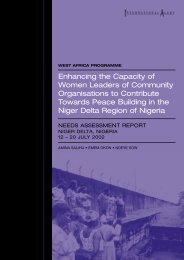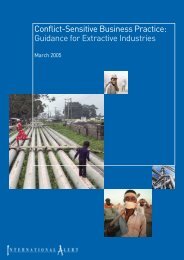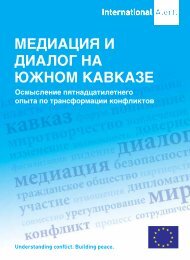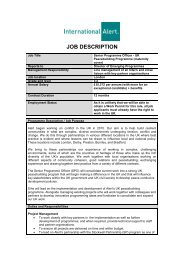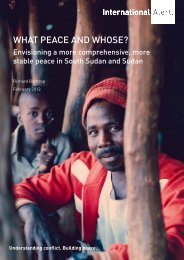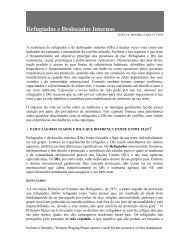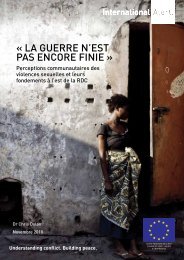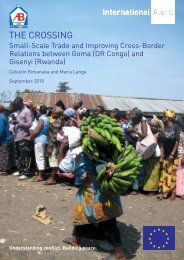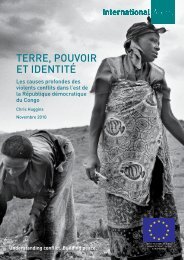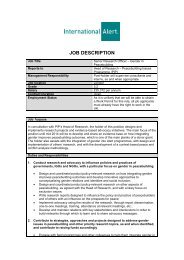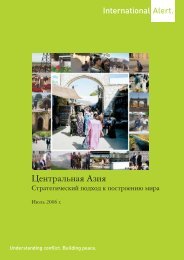Walking in the Dark: informal Cross-border trade ... - International Alert
Walking in the Dark: informal Cross-border trade ... - International Alert
Walking in the Dark: informal Cross-border trade ... - International Alert
Create successful ePaper yourself
Turn your PDF publications into a flip-book with our unique Google optimized e-Paper software.
<strong>Walk<strong>in</strong>g</strong> <strong>in</strong> <strong>the</strong> <strong>Dark</strong>: Informal <strong>Cross</strong>-<strong>border</strong> Trade <strong>in</strong> <strong>the</strong> Great Lakes Region<br />
35<br />
women encountered no particular problems; 116 secondly, even among those who recognised <strong>the</strong>y<br />
were treated differently, <strong>the</strong> problems identified by both men and women as a priority related to<br />
<strong>the</strong> cost of taxation and harassment. Problems for women <strong>trade</strong>rs would, <strong>the</strong>refore, seem to be<br />
broadly <strong>the</strong> same as those for men, a ra<strong>the</strong>r strik<strong>in</strong>g result. Perhaps this can be expla<strong>in</strong>ed by <strong>the</strong><br />
format of <strong>the</strong> questionnaire (<strong>the</strong> way <strong>in</strong> which <strong>the</strong> question was asked) and <strong>the</strong> cultural sensitivity<br />
of <strong>the</strong> question.<br />
None<strong>the</strong>less, specific problems fac<strong>in</strong>g women were identified dur<strong>in</strong>g <strong>the</strong> focus group <strong>in</strong>terviews<br />
and targeted <strong>in</strong>terviews. First of all, women compla<strong>in</strong>ed above all about <strong>the</strong> physical hardship of<br />
<strong>trade</strong>. They must cover long distances by foot <strong>in</strong> hot and dusty conditions, often carry<strong>in</strong>g heavy<br />
bags that weigh up to 100kg. Most of <strong>the</strong>m also engage <strong>in</strong> street vend<strong>in</strong>g because <strong>the</strong> market<br />
stalls are already occupied or because <strong>the</strong> sums requested are too high. Men can use bicycles to<br />
transport heavy loads, whereas women must hire transporters at additional cost.<br />
Secondly, exist<strong>in</strong>g research has shown <strong>the</strong> crush<strong>in</strong>g weight of family responsibilities borne by<br />
women. 117 The fact that <strong>the</strong>y are <strong>in</strong>volved <strong>in</strong> <strong>trade</strong> does not free <strong>the</strong>m from <strong>the</strong>se responsibilities.<br />
Their work means <strong>the</strong>y return to <strong>the</strong> home late <strong>in</strong> <strong>the</strong> even<strong>in</strong>g and are <strong>the</strong>n obliged to take care of<br />
<strong>the</strong>ir household chores. In <strong>the</strong> morn<strong>in</strong>g, <strong>the</strong>y must sometimes work <strong>in</strong> <strong>the</strong> fields before head<strong>in</strong>g off<br />
to <strong>trade</strong> <strong>the</strong>ir goods. The fact that women have <strong>the</strong>ir own capital and often provide <strong>the</strong> family’s<br />
ma<strong>in</strong> source of revenue is result<strong>in</strong>g <strong>in</strong> a change <strong>in</strong> household power structures. In several cases,<br />
<strong>the</strong>y even manage household revenue. This creates particular tensions as men often struggle to<br />
accept a situation <strong>in</strong> which <strong>the</strong> woman places herself ‘at <strong>the</strong> level of <strong>the</strong> man’. 118 In <strong>the</strong> region’s<br />
patriarchal societies, this <strong>in</strong>dependence challenges cultural norms about mascul<strong>in</strong>e authority (and/<br />
or men’s capacity as <strong>the</strong> household provider). Accord<strong>in</strong>g to some of <strong>the</strong> men <strong>in</strong>terviewed, <strong>trade</strong><br />
and <strong>the</strong> profits it generates have given ‘too much freedom’ to women and have resulted <strong>in</strong> ‘disda<strong>in</strong><br />
among women towards <strong>the</strong>ir husbands and even divorce’. 119 As one teacher summed up: ‘This<br />
economic <strong>in</strong>dependence represents a danger for <strong>the</strong> stability of <strong>the</strong> household’. 120 Fur<strong>the</strong>rmore,<br />
<strong>the</strong> activities of women <strong>trade</strong>rs are subjected to prejudice: <strong>the</strong> fact that <strong>the</strong>y leave <strong>the</strong> house<br />
early, return home late, are away from <strong>the</strong>ir husbands and must speak on friendly terms with <strong>the</strong><br />
<strong>border</strong> authorities and o<strong>the</strong>rs (to ensure <strong>the</strong>ir goods cross <strong>the</strong> <strong>border</strong> at <strong>the</strong> lowest possible cost)<br />
is considered to be morally “bad”; <strong>the</strong>y are often considered as “free women”.<br />
Such reason<strong>in</strong>g is not widespread, but was none<strong>the</strong>less observed across all sites. Women <strong>trade</strong>rs<br />
recognise that such op<strong>in</strong>ions exist, but feel that ‘men can th<strong>in</strong>k whatever <strong>the</strong>y want, but we have<br />
to try to get by <strong>in</strong> this way. Their op<strong>in</strong>ions won’t kill us as long as our conscience is clear’. 121<br />
This moral judgement is ma<strong>in</strong>ly shared by those who are not <strong>in</strong>volved <strong>in</strong> <strong>trade</strong>, as opposed to<br />
those with<strong>in</strong> <strong>the</strong> <strong>trade</strong>r’s household itself; <strong>the</strong> latter recognise that small <strong>trade</strong> is essential for <strong>the</strong>ir<br />
survival. It should also be po<strong>in</strong>ted out that many women became <strong>in</strong>volved <strong>in</strong> <strong>trade</strong> because <strong>the</strong>ir<br />
husbands were unemployed. As one woman <strong>trade</strong>r remarked that, <strong>in</strong> such a situation, ‘<strong>the</strong> woman<br />
acts as <strong>the</strong> lungs of <strong>the</strong> household’. 122<br />
Thirdly, men and women offered different <strong>in</strong>terpretations of <strong>the</strong> harassment encountered at<br />
<strong>border</strong> cross<strong>in</strong>g po<strong>in</strong>ts. The focus groups and targeted <strong>in</strong>terviews revealed that men had difficulty<br />
<strong>in</strong> accept<strong>in</strong>g such treatment. The fact that harassment was carried out by ano<strong>the</strong>r man is seen as<br />
particularly <strong>in</strong>sult<strong>in</strong>g: ‘a man can’t tolerate that from ano<strong>the</strong>r man’. 123 Fur<strong>the</strong>rmore, <strong>the</strong> feel<strong>in</strong>g<br />
that women are better adapted to handle such difficulties is common; <strong>the</strong>y are seen to have better<br />
116 A figure that is notably higher for women (42 percent) than for men (35 percent).<br />
117 M. Fontana (2006). ‘Survey of research on gender and <strong>trade</strong>: <strong>in</strong>sights, gaps and coverage,’ Paper for Session 3: Lessons from research<br />
Gender <strong>in</strong> Global and Regional Trade Policies: Contrast<strong>in</strong>g Views and New Research, CSGR, University of Warwick, 5-7 April 2006, page 4.<br />
118 Interviews with female <strong>trade</strong>rs, Uvira, 13th October 2011.<br />
119 Female <strong>trade</strong>r dur<strong>in</strong>g focus group, Aru, 11th November 2011.<br />
120 Interview with teacher, Bukavu, 21st October 2011.<br />
121 Interview with woman <strong>trade</strong>r, Ruzizi, 21st October 2011.<br />
122 Women <strong>trade</strong>rs focus group, Bukavu, 21st October 2011.<br />
123 Women <strong>trade</strong>rs focus group, Bukavu, 20th October 2011.



